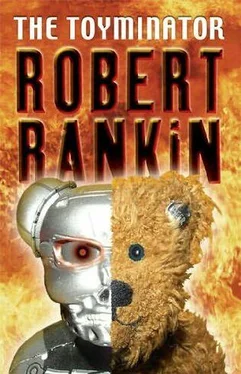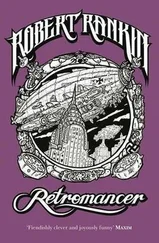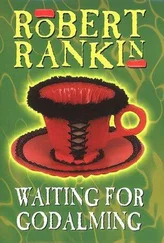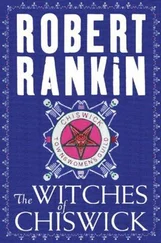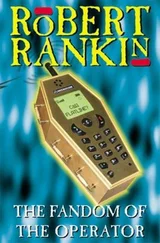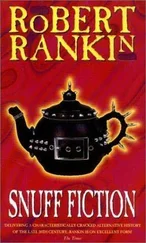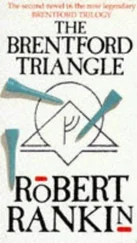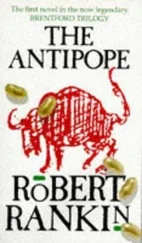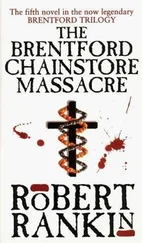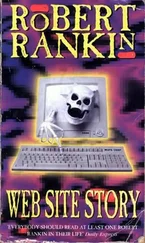
The Toyminator
Robert Rankin
FOR
JAMES CAMPBELL
FRIEND AND MENTOR.
Who inspired the writing of this book, as with many others
And who put me back together when I had all but fallen apart
No finer friend could any man have.
Thank you Jim.
The rain came down in great big buckets, emptied from the sky.
The city’s population stayed indoors. Those of the clockwork persuasion greatly feared the rain, for rain brought on the terrible rust, the terrible corrosion. Those of fur dreaded sogginess, and those of wood, the stains. The rubber ducks were happy, though, but then they always are.
The city was Toy City, formerly Toy Town, and it stood there, somewhere over the rainbow, just off the Yellow Brick Road and beyond the mysterious Second Big O. And it stood there at this present time a-soaking in the rain.
The city’s population blamed the rain upon the recently deposed mayor. In fact, the city’s population now blamed almost everything upon the recently deposed mayor. And not without good cause for the most part, although blaming him for the inclement weather was, perhaps, pushing it a bit.
Not that the city’s population were above pushing it a bit, for had they not risen up against the mayor and marched upon the mayoral mansion with flaming torches, pots of tar and many bags of feathers? And had they not dragged the city’s mayor from his mayoral mansion, performed unspeakable acts upon his person and cast him beyond the city’s gates, with the advice that he should never return, come wind or, indeed, come rain?
Indeed they had.
It had all been most unpleasant.
And if the tarring and feathering and the endurance of unspeakable acts and the casting forth from the city had been most unpleasant for the mayor, these things were as nought when compared to those things that were done to him by the kindly, lovable white-haired old Toymaker, when the ejected mayor returned to the city under cover of darkness to seek sanctuary at his manse. Having cleaned up the ex-mayor, the kindly, lovable white-haired old Toymaker had demodified him. Which is to say that he removed all the modifications that he had made to the mayor in return for a great service that the mayor had performed for the city, in fact a great service for which he had been granted the office of mayor.
The kindly, lovable white-haired old Toymaker did not demodify the mayor in order to add insult to injury. He did not do it out of cruelty. Rather he did it out of compassion, blaming himself, he said, for making modifications that should never have been made – playing God, as he put it. He apologised profusely to the ex-mayor as he put him through the process of demodification. He told the ex-mayor that it was all for the ex-mayor’s own good and that the ex-mayor would thank him for it one day, and then he had given the ex-mayor a nice cup of tea, patted him upon the head and sent him upon his way, offering his own words of advice, to whit, that the ex-mayor should in future keep within his remit and not aspire to a position above his natural station in life.
“Now go and be good,” said the Toymaker, slamming shut his front door behind the ex-mayor.
The door of Tinto’s Bar hadn’t opened all evening. What with the rain and everything, business had been slack. Business, in fact, was no business at all and Tinto’s Bar was empty.
“I blame it on the ex-mayor,” said Tinto, to no one but himself, as he stood behind his bar, a dazzling glass in one dextrous hand, a barcloth in the other. “I remember the good times, me. Well, I would if there’d ever been any.”
Tinto’s Bar was long and low, all patterned in black and white chequerboard. A long and low counter it had, with a row of chromium barstools. There were tables and chairs that were shabby, but served. A dolly called Nellie, who worked the weekends. A pot man called Henry, who didn’t.
Tinto the barman was something to behold. He was of the mechanical persuasion, powered by a clockwork motor, his body formed from pressed tin and glossily painted, though much of the gloss was now gone. His head was an oversized sphere, with a smiling face painted on the front. His body was a thing-a-me-oid (a cylinder with a hemisphere joined to each end of it), painted with a dicky bow and tuxedo. His arms were flat, though painted with sleeves and shirt cuffs, and the fingers of his hands were fully and wonderfully articulated.
Now, in the light of things that are shortly to occur, it might be well to mention that Tinto was a practising member of The Church of Mechanology, which was one of The Big Four religions in Toy City along with The Daughters of the Unseeable Upness, Big Box Fella, He Come and The Exclusive Brotherhood of the Midnight Growlers. Mechanologists held to the belief that the Universe was a vast clockwork mechanism, with the planets revolving about the sun by means of extendible rotary arms and the sun in turn connected to the galaxy by an ingenious crankshaft system, the entirety powered by an enormous clockwork motor, constantly maintained, oiled and kept wound by The Universal Engineer.
The Universal Engineer was pictured in religious icons as a large and jolly red-faced fellow in greasy overalls and cap. He held in one holy hand an oily rag, and in the other the Church’s Sacred Writ, known as The Manual .
Followers of The Church of Mechanology considered themselves special and superior to all other varieties of toy, in that being clockwork they were in tune and at one with the Universe.
It could be argued that The Church of Mechanology was something of an End Times cult, subscribing as it did to the belief that, as individual clockwork toys enjoyed only a finite existence, due to the ravages of rust, corrosion, spring breakage and fluff in the works, so too did the Universe.
Elders of the church spoke of The Time of the Terrible Stillness, when the great mechanism that powered the Universe would grind to a halt, the planet would no longer turn upon its axis, the sun would no longer rise and even time itself would come to a standstill.
And at present, what with all the chaos caused by the ex-mayor when he was the then-mayor, there was much talk amongst the practising Mechanologists that The Time Of the Terrible Stillness was now rapidly approaching. In fact, the elders of each of The Big Four religions were presently preaching that The End Times were well and truly on their way, and everyone knew whose fault that was.
Tinto examined the dazzling glass and found it pleasing to behold. At least you knew where you were with a glass. If it was a beer glass, then you were probably in a bar. And as Tinto was in a bar, well, at least he knew where he was. Which was something.
“I think I’ll close up early tonight,” said Tinto to himself, “take a couple of bottles of five-year-old oil upstairs, watch the late-night movie, Rusty the Rotten Dog , drown my sorrows and pray for sunshine tomorrow. You have to make the effort, don’t you? And laugh, too, or so I’ve been told, because you’ll cry if you don’t. And crying really rusts tin toys, as salt water’s worse than rain.”
Tinto had recently taken to the reading of certain “self-help” books. It was all very well being a practising member of The Church of Mechanology, or rather, in truth, it was not , it was just too damned depressing, and although Tinto could not actually remember any particularly good times, he was generally of a cheery disposition. Or he had been until recently.
Читать дальше
